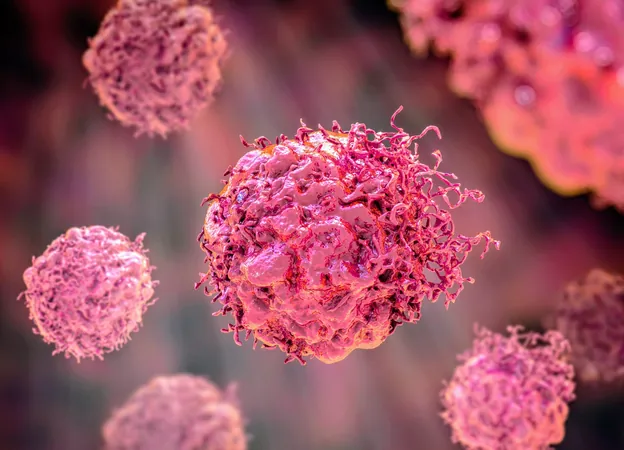
Revolutionary Discovery: How Scientists Deciphered the Death of Cancer Cells, Igniting a New Era in Treatment!
2025-01-14
Author: Jessica Wong
Revolutionary Discovery: How Scientists Deciphered the Death of Cancer Cells, Igniting a New Era in Treatment!
In a groundbreaking study, scientists at the Children’s Medical Research Institute (CMRI) have unveiled crucial insights into the enigmatic behavior of cancer cells in response to radiation therapy, potentially transforming cancer treatment as we know it.
Led by Dr. Radoslaw Szmyd and Professor Tony Cesare, this remarkable research uncover the critical links between DNA repair mechanisms in cancer cells and their varied responses to radiation. While radiation therapy remains a cornerstone of cancer treatment, a perplexing question has lingered: why do some cancer cells succumb to radiation while others remain? This study sheds light on this mystery, revealing that the survival and death of cancer cells are intricately tied to how they repair damage caused by radiation.
Why Some Cancer Cells Go Undetected
The findings indicate that the manner in which cancer cells manage DNA repair significantly influences their fate post-radiation. Specifically, when cancer cells employ a repair process known as homologous recombination, they tend to die in a manner that eludes the immune system's detection—silently disappearing without raising an alarm. This allows the tumor to evade the body's natural defenses, hindering the overall effectiveness of the treatment.
Conversely, when cancer cells utilize alternate DNA repair pathways, they emit byproducts that mimic signals of viral or bacterial infections. This molecular "siren" activates the immune system, prompting it to target and attack residual cancer cells—an outcome that could be pivotal for improving patient prognoses.
Game-Changing Insights for Cancer Treatment
The research revealed a revolutionary possibility: by inhibiting homologous recombination, scientists can convert the silent cell deaths of cancer cells into a more detectable form, effectively turning the immune system into a powerful ally in the fight against cancer. This discovery opens the door to innovative treatment strategies that blend traditional radiotherapy with emerging immunotherapies. Such combinations could heighten the immune response and enhance cancer's eradication, significantly lowering the risk of recurrence.
“Cancer cell death following radiation is highly dependent on specific DNA repair pathways, which has profound implications for our treatment strategies,” noted Professor Cesare from the University of Sydney. This advancement could lead to a substantial rise in treatment success rates and patient survivability.
An Ongoing Battle with Cancer
As cancer remains a leading cause of morbidity and mortality worldwide, this breakthrough brings renewed hope. The meticulous efforts of Dr. Szmyd, who dedicated six years to this intricate research, coupled with live cell imaging technologies, have provided invaluable clarity in understanding cancer biology.
The study emphasizes the importance of collaborative scientific exploration and innovative techniques in unraveling cancer's complexities. With continued research based on these findings, there is a tangible promise for more effective, life-saving treatment paradigms that could redefine the battle against cancer.
The results of this pivotal study have been published in the prestigious journal *Nature Cell Biology*, further validating the potential impact on global cancer treatment strategies.
Stay Ahead in Medical Discoveries!
Don’t miss out on groundbreaking health news—subscribe now to stay informed about the latest advancements in cancer treatment and much more!



 Brasil (PT)
Brasil (PT)
 Canada (EN)
Canada (EN)
 Chile (ES)
Chile (ES)
 Česko (CS)
Česko (CS)
 대한민국 (KO)
대한민국 (KO)
 España (ES)
España (ES)
 France (FR)
France (FR)
 Hong Kong (EN)
Hong Kong (EN)
 Italia (IT)
Italia (IT)
 日本 (JA)
日本 (JA)
 Magyarország (HU)
Magyarország (HU)
 Norge (NO)
Norge (NO)
 Polska (PL)
Polska (PL)
 Schweiz (DE)
Schweiz (DE)
 Singapore (EN)
Singapore (EN)
 Sverige (SV)
Sverige (SV)
 Suomi (FI)
Suomi (FI)
 Türkiye (TR)
Türkiye (TR)
 الإمارات العربية المتحدة (AR)
الإمارات العربية المتحدة (AR)